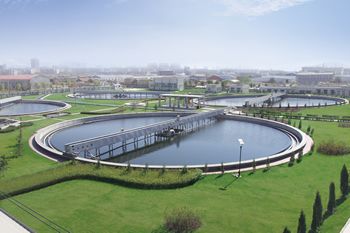Sewage Treatment Firms Eye Opportunities in China
Published on by Water Network Research, Official research team of The Water Network in Business
Global sewage and water treatment firms are eyeing opportunities in an unsavoury place: a growing pile of waste in China, the world's most populous nation.

Ji’nan Waste Water Treatment Project, Source: Everbright Water
The country has been for years battling contamination from fertiliser run-offs, heavy metals and untreated sewage. A survey in 2015 showed that nearly two-thirds of China's underground water and a third of its surface water was unfit for human contact.
To reverse this, China has pledged to lay 126,000km of new sewage pipes by 2020, enough to circle the globe three times, and raise urban wastewater treatment by 50 million cubic m a day, equal to 20,000 Olympic-size pools.
This has opened the floodgates to sewage specialists, such as Israel's Emefcy, RWL Water - controlled by Estee Lauder's Mr Ron Lauder, and France's Veolia, who want to grab a share of the market, with China's annual environmental spend estimated at 3 trillion yuan (S$609 billion) over the next five years.
Foreign players have been in China for a while - such as Veolia, which has water projects across the country - but the focus on a large-scale clean-up has gained impetus only recently. China's latest five-year plan, released in 2016, emphasises tackling pollution, while in an action plan published in 2015 the government vowed to improve water quality nationwide by 2030, pledging to spend billions of dollars.
The local authorities, meanwhile, have struggled to fund their plans, opening the door for more private-sector involvement.
Emefcy plans to put eight small-scale sewage treatment units into operation in China by the end of this year and is building a local factory, saying its small-scale units can treat 20,000 litres a day, take two months to install and have significantly lower energy costs, making them ideal for the rural market.
General manager Xue Xiaohu at Jiangsu Greenway, which sells water treatment technology to the textiles industry, said stricter environmental standards are drawing in companies of all sizes, but big state-owned firms still dominate major projects.
China has promised to give environmentally friendly projects a leg-up by providing banks with more incentives to lend and encouraging green financing.
Read more: The Straits Times
Media
Taxonomy
- Sewage Treatment
- Governance
- Business Strategy
- Governance & Policy
- Sewage
- Water Management
- Water Quality Management
- Infrastructure
- Finance and Markets
- Integrated Water Resources Management (IWRM)